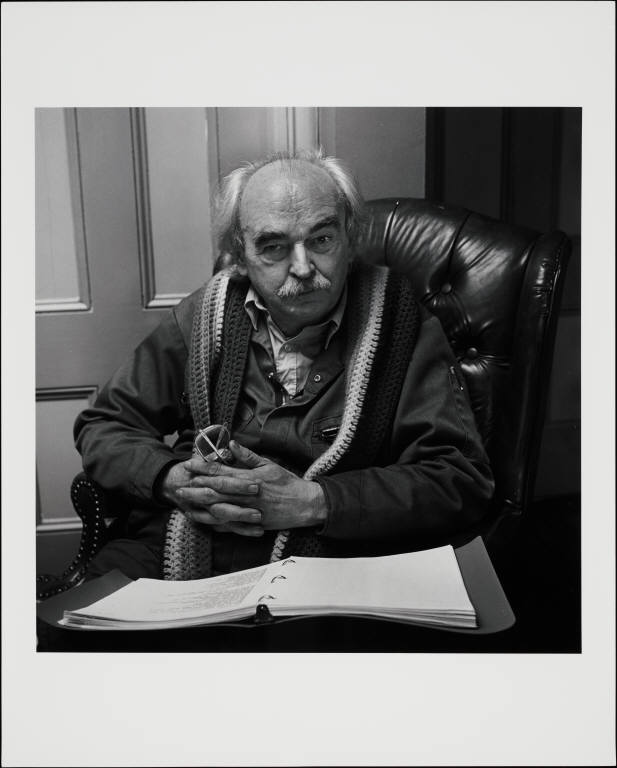

Queer Places:
1814 38th St, Galveston, TX 77550
 Jim Kepner
(August 19, 1923 - November 15, 1997) was both a pioneering gay journalist and a homophile activist who founded
the International Gay and Lesbian Archives.
Jim Kepner
(August 19, 1923 - November 15, 1997) was both a pioneering gay journalist and a homophile activist who founded
the International Gay and Lesbian Archives.
In September 1923, aged about eight months, James Lynn Kepner was found, wrapped in a Houston newspaper, under an oleander bush in Galveston, Texas. He did not learn that he had been adopted into a hard-drinking, working-class family until he was nineteen. Later, he recalled having been "aware of being different from age four." He also recollected that, "I'd wanted to write by age nine, when the Galveston Daily News printed an awful poem of mine." In 1942 he followed his adoptive father to San Francisco, witnessed his first raid of a gay bar (the Black Cat), and began collecting books and clippings about homosexuality. His penchant for collecting books and clippings about homosexuality would ultimately result in a large and valuable archive. Between 1943 and 1951, the restless Kepner moved to Los Angeles, New York, Miami, back to San Francisco, and finally settled in Los Angeles. He wrote for several science fiction magazines in 1947-48, and wrote movie reviews for San Francisco's Daily People's World in 1949. He was secretary, then president, of the Los Angeles Science Fantasy Society and led a splinter group that became the Futurian Society. Its members joined the Communist Party, from which Kepner was expelled for homosexuality. Kepner was taken to a Mattachine Society discussion group in December 1952 and became active in it. However, he was uncomfortable with the ashamed unassertiveness of most of its other members. Beginning in April 1954, he wrote extensively for ONE Magazine under his own name and several others: "I wrote about Gay news, about who we are, why we are so, what we want and how we might achieve it," he later recollected. His use of pseudonyms was not to hide his identity (since he also published under his own name), but to disguise the fact that ONE Magazine had so few staff writers. Assisted by correspondents from around the country, who sent him clippings from local newspapers about police raids and crackdowns, Kepner also documented the witch hunts of the era. In contrast to Mattachine's "we're the same as straight people except for what we do in bed" line, Kepner celebrated homosexual differences (what he called, "superiorities") from his first ONE Magazine publication onward. He also insisted that freedom of association applied to homosexuals, a position the California Supreme Court had reached in Stoumen v Reilly (1951), but which was recurrently undercut by police and liquor board personnel, whose practices were regularly exposed in Kepner's articles. That freedom of speech extended to homosexual rights advocacy was reaffirmed by the United States Supreme Court in 1958 in a landmark ruling in which Kepner played a part. In October 1954, Los Angeles postmaster Otto Olesen seized copies of ONE Magazine and refused to allow it to be mailed on the grounds that it was "obscene, lewd, lascivious, and filthy." Although lower courts upheld the postmaster's decision, the United States Supreme Court's unanimous reversal paved the way for the freer dissemination of gay rights advocacy. Kepner and W. Dorr Legg began teaching classes on homosexuality in a worldwide perspective at ONE Institute in 1956. In 1960, tired of battling the authoritarian and conservative Legg, Kepner withdrew from ONE activities, became a cab driver, and enrolled in Los Angeles City College. He recalled taking classes he could easily have taught. Kepner helped organize a February 11, 1967 rally following a police raid on the Los Angeles Black Cat bar. The rally increased membership in a new militant group named PRIDE that had been hastily formed. Kepner edited and wrote much of its newsletter, which became The Los Angeles Advocate, a newspaper that evolved into the national newsmagazine The Advocate, for which he also wrote. Starting in 1971, Kepner made the documents and memorabilia that he had been amassing available to researchers at a place he rented. This ultimately became the International Gay and Lesbian Archives, consisting of over 25,000 books, as well as many thousands of other items. Kepner's archives were merged with the collection of the ONE Institute in 1994 at the University of Southern California. The combined collection comprises more than 2,000,000 items. An anthology of Kepner's 1950s writing, Rough News, Daring Views: Pioneer Gay Journalism was in press at the time of Kepner's death in Midway Hospital in Los Angeles on November 15, 1997. Until his death, he continued to tinker with Becoming a People: A 4,000-Year Chronology of Gay and Lesbian History, which he had published privately in 1983.

Featured in
Particular Voices: Portraits of Gay
and Lesbian Writers by Robert Giard [Rights Notice: Copyright Jonathan G. Silin (jsilin@optonline.net)]
My published books: